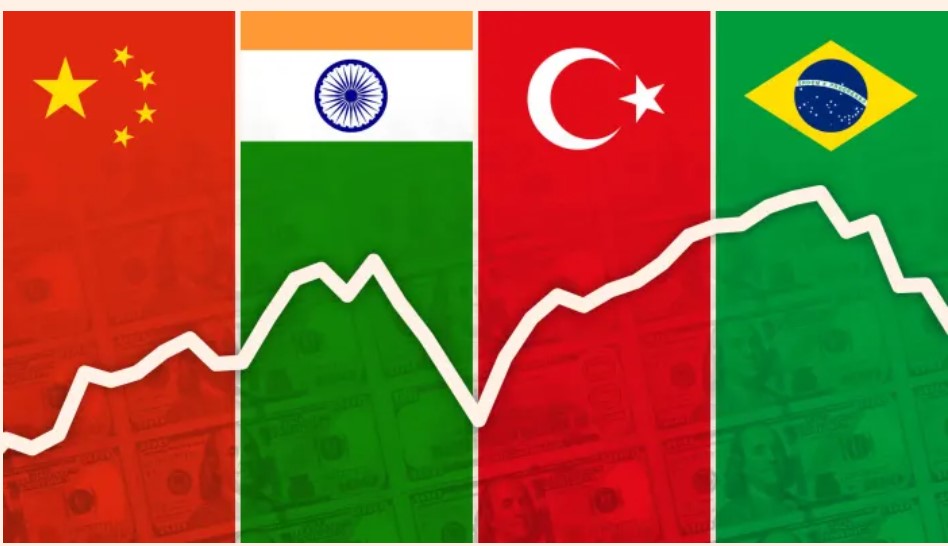Danske Research warns investors about more shocks to hit the already badly-stricken EM asset class. The report titled ”Looming global food crisis marks another shock”, it is claimed that “As most of Ukraine’s wheat exports targets countries in Middle East and North Africa, countries like Egypt, Turkey and Lebanon are vulnerable”. Danske is afraid of EM debt spasms, and scenarios a la Arb Spring, wherein once again Turkey’s vulnerabilities may feature large.
These are highlights from the report
The war in Ukraine is sending yet another shockwave globally and will hit emerging markets at a challenging time. Over our forecast horizon, tighter global financial conditions and weaker external demand combined with high inflation all weigh on the EM economic outlook. In longer term, demographic dividend and technological ‘leapfrogging’ continue to support the case for investing in emerging markets, but ramifications from the pandemic and the war in Ukraine could hamper such investments if western businesses resort to broad-based near-sourcing of production and supply chains.
Economic activity in EM Europe is expected to contract this year while growth in EM Asia will slow down markedly. Same time, a growth rate at around 4% in Sub-Saharan Africa is insufficient to produce better living standards for an average African. Considering the recent weakness in the Chinese economy, we see downside risks to IMF’s forecast of 5.4% growth for Asia this year. Weaker momentum in the Chinese manufacturing sector will also weigh on Latin American commodity exporters, and while the region still benefits from economic strength in the US, historically, economic downturns tend to spill over with a one-quarter lag.
The war in Ukraine has severely disrupted supply chains of agricultural products. Russia and Ukraine combined have a substantial market share in several cereals such as wheat and barley, and a dominating market share in the global sunflower oil market. Resulting both from weather-related shocks as well as from sanctions and war related disruptions in logistics in and around Ukraine, the FAO food price index has risen to all-time highs driven by higher oils and cereals prices. Concerning signals continue to mount as food-producing countries have recently started to implement export bans to ensure domestic food security and prevent price increases in the homeland.
The situation has similarities to 2008-09 when the world last grappled with a food crisis. Most EM and developing economies rely on food imports to feed their growing population. As the global food crisis looms, food-importing low-income countries in Africa and Asia are the most exposed to high prices and disruptions in trade. However, as most of Ukraine’s wheat exports targets countries in Middle East and North Africa, countries like Egypt, Turkey and Lebanon are also vulnerable.
Turkey’s Slow-Motion Currency Crash
The continuous need to support the most vulnerable populations in the context of a protracted pandemic, and now, in the context of rising costs of living, will challenge EM public finances at a time when overall debt levels are at all-time highs and financing costs are rising on the back of tighter global financing conditions. The risk of further capital outflows raises the risk of debt rollover problems and local currency depreciation particularly for economies with unsustainable debt levels and twin deficits.
More monetary tightening is needed
While many EM economies have resorted to pre-emptive monetary policy tightening this time around, real rates remain negative across EM implying more tightening is needed. Based on IMF data, total investment flows to EM have been negative since 2017. According to the IIF, at end of May 2022, year-to-date portfolio outflows from a sub-set of EM economies accumulated to USD 56bn. More tightening is key to avoid further capital outflows, but same time; tighter monetary policy stance could add pressure on servicing public and private debt and will further weigh on economic growth.
Tighter US financing conditions have historically led to broad-based EM FX weakness but Fed hikes alone have not triggered a sustained tightening in financial conditions. In fact, tighter conditions often result from market stress, and hence, we think particularly wider credit spreads will be a key determinant for EM FX, with LatAm FX historically the most exposed. According to our estimates, economies most vulnerable to further outflows and currency depreciation are the ones with the weakest external position, such as Sri Lanka, Egypt, India, Turkey and Brazil.
Debt distress rises across the board
In June 2022, the World Bank estimates that seven emerging and developing economies are already in debt distress and 30 economies are at a high risk of such. The spillover to global markets should be limited even in case of much-needed debt restructurings as the list includes mostly low-income and lower middle-income economies.
In longer term, however, rising inequality between the rich north and the poor south combined with shocks arising from climate change, and now, from the food crisis, raise the risk of social unrest. In the worst case, new conflicts cause massive humanitarian suffering and trigger new waves of migration towards Europe similar to what we saw during the Syrian refugee crisis in 2015, the root causes of which trace back to the food price riots ahead of Arab spring in 2010.
Follow our English language YouTube videos @ REAL TURKEY: https://www.youtube.com/channel/UCKpFJB4GFiNkhmpVZQ_d9Rg
And content at Twitter: @AtillaEng
Facebook: Real Turkey Channel: https://www.facebook.com/realturkeychannel/
